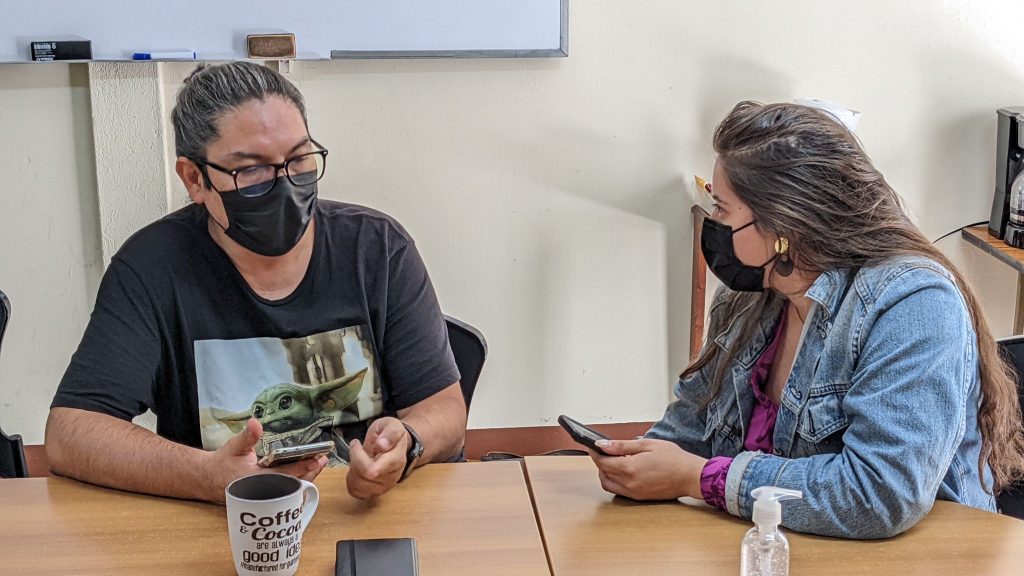Date: Sep 28, 2022
Author: Yadira Sánchez-Esparza
*In July 2022, our Program Assistant Yadira Sánchez-Esparza for the Mexico and Central America Programs joined an Emergency Human Rights Delegation led by the Guatemala Human Rights Commission to visit Prensa Comunitaria.

Nelton Rivera and Yadira Sánchez-Esparza during a meeting with the Emergency Human Rights Delegation and Prensa Comunitaria. Photo , taken July 25, 2022 by Dan Moriarty.
In Guatemala, we are witnessing the criminalization of the truth. But only recently has the distressing situation of violence against journalists in Guatemala reached the international stage. Instead of upholding journalists’ right to report, under President Giammattei’s administration, publicly harassing and intimidating various press representatives became the norm in Guatemala. But this is not new. Giammattei has built off of the legacy of former President Jimmy Morales’ that promoted the violent use of misinformation and defamation of the press.
And there have been serious consequences. The Association of Guatemalan Journalists (APG) reported that from 2020 to June 2022, there have been 350 attacks and restrictions on the press. The statistics cannot capture the diversity and magnitude of the intimidation, harassment, defamation, and attacks both virtually and physically that journalists all over Guatemala confront by simply speaking out.
Both inside and outside the capital, journalists are feeling the eerie pressure of surveillance and intimidation. For women, many are sexually harrassed both virtually on their professional online accounts and physically. Their addresses are posted on social media, and they are intimidated to remain quiet. Indigenous journalists who report on the environmental harms of mining projects, pollution of water, and other threats to their ancestral lands experience are threatened with weapons or their homes are broken into.
One of the most common tactics is the use of false charges to incarcerate and silence journalists. For example, the Mayan K’iche’ communicator Anastasia Mejía Tiquiriz, director of the community media source Xol Abaj, was charged for the crimes of sedition, aggravated assault, arson and robbery. These defamation and threats against her came from her reporting on a demonstration against the mayor Francisco Carrascosa that was live streamed through her Facebook page with more than 157,000 followers.
Recently, José Rubén Zamora the president of Guatemala’s media outlet, ElPeriódico was arrested under false charges. Within hours, the story spread across the world. This case is one of many that highlight the urgency of the situation in Guatemala. However, most journalists do not have such high profiles to cause such instant and public backlash. In fact, when falsely arrested, the majority of journalists are left to rely on their friends, families, small local networks, and small civil society partners in order to be released or fight the charges brought against them. There are many who spend weeks or years without being released. Journalists face these conditions for using their right to free speech and report on what is happening in their community. How is this possible if the reporters are protected by Article 35 of the Guatemalan Constitution which protects their right to speak freely and critically?
The answer: impunity.
Despite the creation of the Office of the Prosecutor for Crimes against Journalists only a few years ago, Guatemala still ranks 124 out of 180 countries on the press freedom index. This is because while technically freedom of the press is protected, it is not enforced and those responsible for attacks against journalists often have connections with those in charge of bringing justice. As a result, Guatemala has created an environment where journalists are forced to self-censor in fear of retaliation. As Nelton Rivera Gónzalez, a historian and photojournalist who is an integral part of the research team at Prensa Comunitaria, the independent media outlet that supports community and Indigenous reporting, explains “to be a journalist in Guatemala is to work alone, there is no state to help you.”
Journalists are only one of the many groups whose voices are being silenced by any means necessary in Guatemala. The very same patterns of criminalization we see used for journalists, are also being used against human rights defenders, Indigenous community leaders, students, and prosecutors at the highest levels.
With this level of attacks on press freedom, the truth is in danger in Guatemala. The international community, including the U.S. government, should not stand by as statistics of threats against journalists become statistics of journalists being murdered and should pay attention to attacks on community journalists as well as higher-profile ones. If Guatemalan journalists are continuing to speak out while in hiding, in jail and in danger then we have no excuse to remain quiet. Stand with us in demanding that the Guatemalan government respects journalists’ rights to report freely and that ALL threats and attacks against journalists are investigated.
#NoNosCallaron

